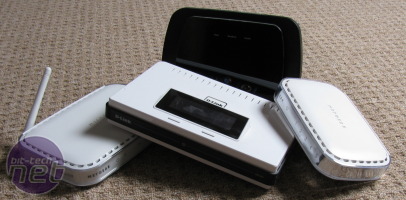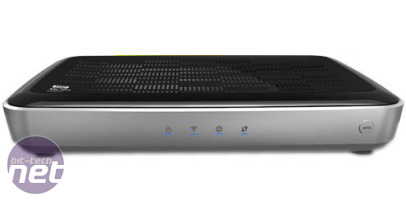Router reboot
August 14, 2012 | 09:30

If you play any decent amount of online games, you’ll likely have shared my situation. Half way through a tense round, your connection suddenly freezes. You’re kicked from voice comms and dumped from the server. Yep, the router’s frozen again, so it’s off to dig it out from its hiding place behind the desk/bookcase/pile of old shoes to unplug it and re-start it. [break]
Of course, routers provided by your ISP will usually be the lowest possible spec that the provider can get away with. When you’re giving out literally millions of devices to customers, saving £1 on a decent heatsink here or a cooling fan there quickly adds up. This then leads to a router that loves to fall over when thrashed with the high-bandwidth requirements of people doing more than just checking email or downloading the odd MP3. Add in multiple wi-fi devices, streaming 1080p video from a NAS box and playing online games at the same time and you soon find that, at least in my experience, ISP-provided routers just can’t keep up with the demands of a high-end users.

Even worse, there’s port forwarding. Forget player vs. player grudge matches, when it comes to online gaming, this is my greatest foe. Xbox Live or PSN require just a few ports opened, so ISPs configure routers as standard to accommodate them.
PC games can’t make up their minds though, so if you’re router isn’t clever enough to do it itself, you’ll need to dig into its settings and set port forwarding up. Doing this, you’ll also need to configure static IPs else the port-forward won’t work next time you have to, yep, reboot the router, and woe-betide you if you want to forward the ports for a game to two different PCs! I’ve spent literally hours over the last few years fiddling with router settings for games when putting together larger multiplayer games, particularly for older titles. Between Windows 7’s own port forwarding, the router’s port forwarding and the endless amount of tinkering, it’s no wonder many users opt for console games. After all, they just work.
It’s not over yet though. Despite a router being a product that can technically last 5+ years (after all, wi-fi standards and ADSL connection protocols haven’t changed), router manufacturers have a diabolical track record when it comes to product support. We reviewed this hateful product a few years back to a highly positive conclusion, only for us to find down the line that it had a bug which severed all active connections once every 24 hours while it updated its internal clock. The only fix was to log into the router’s debug menu and terminate the offending service, which of course you had to do, every time you rebooted the router. The last public firmware update for this device was made available October 21st 2008; what a kick in the teeth for those that shelled out £90 for a better online experience.
It’s not the only offender though. I’ve used routers which offered beta firmware that caused major instabilities and others that simply died on their arse after 12 months of use. In total, over the last four years, I’ve used a grand total of seven different modem routers; three provided by ISPs and an incredible four from after-market router manufacturers, none of which have met my expectations.

Having become more and more disgruntled though, there is a glimmer of hope, at least for me. It’s come in the unlikely form of Western Digital, who handed us a sample of its new N900 Router a few months back. With no recent comparative tests to judge it against, we were pessimistic about publishing a full review, but being tortured by a flaky D-Link router at home, I jumped at the chance of a possible replacement.
The difference has been light and day. The N900’s current uptime sits at 46 days whereas my past router did well to last a week. Setup was a breeze as well and even when playing older games, that in the past have proven to be port-forwarding nightmares, the router hasn’t required me to touch its settings beyond entering my wi-fi password of choice.
Of course, this isn’t a blog post saying you should all go out and buy a Western Digital router. I’ve not tested its network or wi-fi throughput, or VPN capabilities and at £180 it’s ferociously expensive so far as routers go. However, it’s done for me what no other router I’ve used before has; allowed me to just get on with using my Internet connection when and how I like, without me having to reach for the reset button once. Why can't this be the level of reliability and service offered by all our network gear?
Of course, routers provided by your ISP will usually be the lowest possible spec that the provider can get away with. When you’re giving out literally millions of devices to customers, saving £1 on a decent heatsink here or a cooling fan there quickly adds up. This then leads to a router that loves to fall over when thrashed with the high-bandwidth requirements of people doing more than just checking email or downloading the odd MP3. Add in multiple wi-fi devices, streaming 1080p video from a NAS box and playing online games at the same time and you soon find that, at least in my experience, ISP-provided routers just can’t keep up with the demands of a high-end users.

A Selection of my abandoned networking gear
Even worse, there’s port forwarding. Forget player vs. player grudge matches, when it comes to online gaming, this is my greatest foe. Xbox Live or PSN require just a few ports opened, so ISPs configure routers as standard to accommodate them.
PC games can’t make up their minds though, so if you’re router isn’t clever enough to do it itself, you’ll need to dig into its settings and set port forwarding up. Doing this, you’ll also need to configure static IPs else the port-forward won’t work next time you have to, yep, reboot the router, and woe-betide you if you want to forward the ports for a game to two different PCs! I’ve spent literally hours over the last few years fiddling with router settings for games when putting together larger multiplayer games, particularly for older titles. Between Windows 7’s own port forwarding, the router’s port forwarding and the endless amount of tinkering, it’s no wonder many users opt for console games. After all, they just work.
It’s not over yet though. Despite a router being a product that can technically last 5+ years (after all, wi-fi standards and ADSL connection protocols haven’t changed), router manufacturers have a diabolical track record when it comes to product support. We reviewed this hateful product a few years back to a highly positive conclusion, only for us to find down the line that it had a bug which severed all active connections once every 24 hours while it updated its internal clock. The only fix was to log into the router’s debug menu and terminate the offending service, which of course you had to do, every time you rebooted the router. The last public firmware update for this device was made available October 21st 2008; what a kick in the teeth for those that shelled out £90 for a better online experience.
It’s not the only offender though. I’ve used routers which offered beta firmware that caused major instabilities and others that simply died on their arse after 12 months of use. In total, over the last four years, I’ve used a grand total of seven different modem routers; three provided by ISPs and an incredible four from after-market router manufacturers, none of which have met my expectations.

46 days uptime and a stress free internet experience, but these things shouldn't necessitate a £180 router
Having become more and more disgruntled though, there is a glimmer of hope, at least for me. It’s come in the unlikely form of Western Digital, who handed us a sample of its new N900 Router a few months back. With no recent comparative tests to judge it against, we were pessimistic about publishing a full review, but being tortured by a flaky D-Link router at home, I jumped at the chance of a possible replacement.
The difference has been light and day. The N900’s current uptime sits at 46 days whereas my past router did well to last a week. Setup was a breeze as well and even when playing older games, that in the past have proven to be port-forwarding nightmares, the router hasn’t required me to touch its settings beyond entering my wi-fi password of choice.
Of course, this isn’t a blog post saying you should all go out and buy a Western Digital router. I’ve not tested its network or wi-fi throughput, or VPN capabilities and at £180 it’s ferociously expensive so far as routers go. However, it’s done for me what no other router I’ve used before has; allowed me to just get on with using my Internet connection when and how I like, without me having to reach for the reset button once. Why can't this be the level of reliability and service offered by all our network gear?

MSI MPG Velox 100R Chassis Review
October 14 2021 | 15:04





Want to comment? Please log in.